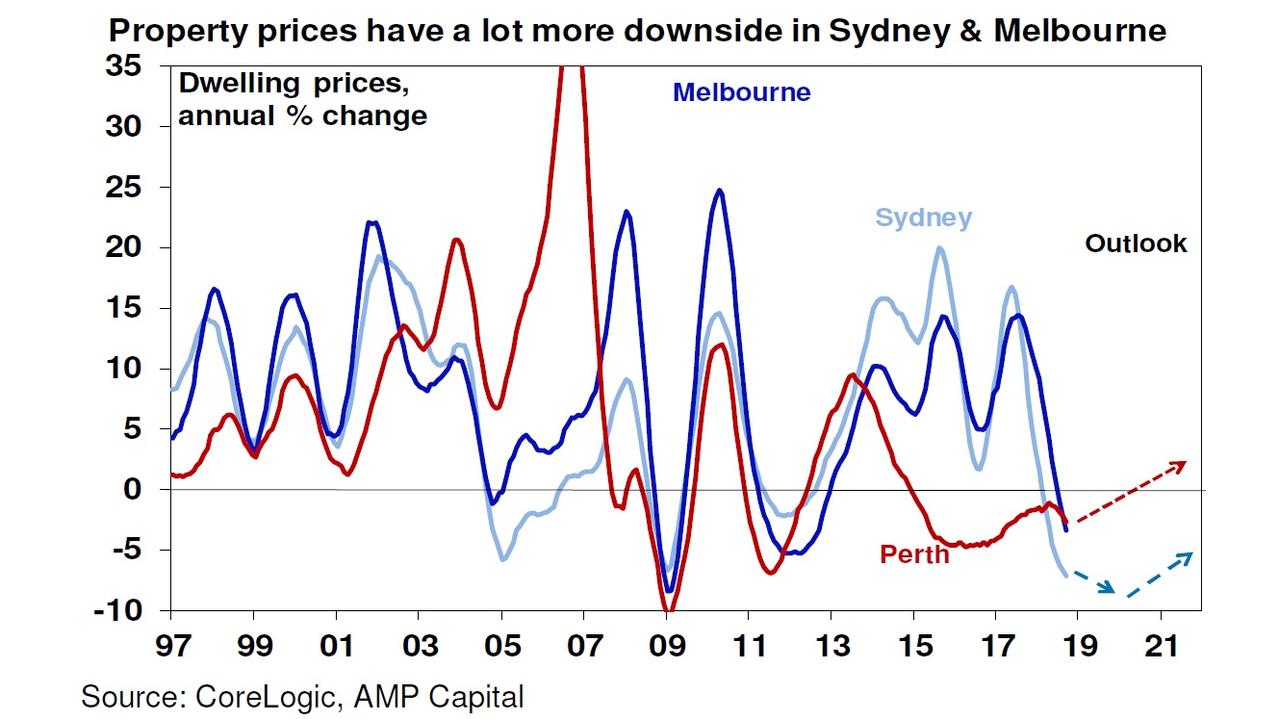AMP downgrades housing forecast, now expects prices to fall 20 per cent by 2020
HOUSE prices could fall by 20 per cent as a “perfect storm” of factors combine to create a negative feedback loop.
AMP Capital has revised its forecasts for the Australian property market downwards as a perfect storm of factors turns the property boom to a “bust”.
The wealth manager had previously predicted top-to-bottom price falls of 15 per cent in Sydney and Melbourne spread out to 2020, or about 5 per cent per year.
In a client note on Thursday, AMP Capital chief economist Dr Shane Oliver said that was now likely to be 20 per cent as “credit conditions tighten, supply rises and a negative feedback loop from falling prices risks developing”.
That would take average prices back to early 2015 levels. Dr Oliver maintained that a “crash”, defined as 20 per cent plus fall in national average prices, was unlikely — but his revised forecast points to near-crash territory.
“The risks are starting to skew to the downside — particularly around tighter credit and falling capital growth expectations made worse by fears of a change in tax arrangements,” he said. “Auction clearances in recent weeks have been running around levels roughly consistent with 7-8 per cent per annum price declines.”
CoreLogic figures show national house prices fell for the 12th consecutive month in September, with Sydney and Melbourne now 6.2 per cent and 4.4 per cent down from their respective peaks in July and November 2017.
Dr Oliver said the tide started to turn about a year ago due to a number of factors including poor affordability reducing the pool of buyers, tightened bank lending standards under pressure from regulators, and a “significant pool” of interest-only borrowers scheduled to switch to principal and interest in the next few years.
Adding to that was banks withdrawing from lending to self-managed super funds, reducing the pool of property investors, and a sharp fall in foreign buyers due to Australian government crackdowns.

Chinese investment in Australian property has fallen by 70 per cent since 2015.
Meanwhile there is rising unit supply, out-of-cycle mortgage rate increases, expectations of changes to tax concessions if Labor wins the next election, and falling price growth expectations creating FONGO, or “fear of not getting out”.
“On their own some of these are not significant, but together they risk creating a perfect storm for the property market,” he said.
Dr Oliver said a crash would require “much higher interest rates or unemployment, neither of which are expected, or a continuation of the recent high construction rates, which is unlikely as approvals are falling, and a collapse in immigration”.
“Strong population growth is continuing to drive strong underlying demand for housing,” he said, adding that while mortgage stress was a risk, “it tends to be overstated”.
“There has been a sharp reduction in interest only loans already, debt servicing payments as a share of income have actually fallen slightly over the last decade, a significant number of households are ahead on their repayments, and banks’ non-performing loans remain low,” he said.
“However, the risk of a crash cannot be ignored given the danger that banks may overreact and become too tight and that investors decide to exit in the face of falling returns, low yields and possible changes to negative gearing and capital gains tax.”
Even without a crash, the property downturn will affect the broader economy “via slowing dwelling construction, negative wealth effects on consumer spending, less demand for household goods and via the banks as credit growth slows and if mortgage defaults rise”.
“This will provide an offset to strong growth in infrastructure spending and solid growth in business investment and will constrain economic growth to around 2.5-3 per cent which in turn will keep wages growth and inflation low,” he said.
AMP’s housing market forecast is the most bearish of the major financial institutions. Morgan Stanley last week said it was expecting 15 per cent falls, “which would mark the largest decline since the early 1980s”, while ANZ and Macquarie have predicted falls of 10 per cent.




